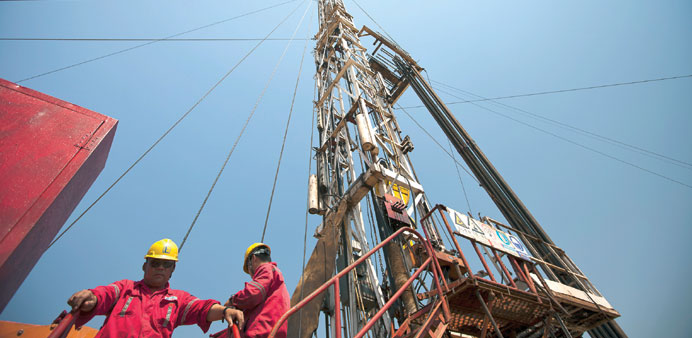Workers from the Petrodar Operating Co check equipment on an oilrig near Melut, in the Upper Nile, Sudan (file). South Sudan expects its first oil to arrive in Sudan’s export port in mid-June as both countries are continuing to implement oil and trade deals.
|
|
South Sudan expects its first oil to arrive in Sudan’s export port in mid-June as both countries are continuing to implement oil and trade deals despite Khartoum’s renewed accusations over rebel support, Juba’s ambassador to Sudan said.
The neighbours, which fought one of Africa’s longest civil wars, agreed in March to resume cross-border oil flows and end tensions plaguing them since the south seceded in 2011.
South Sudan has started since then to pipe oil to two treatment plants in Sudan to be readied for exports, the first time since the landlocked new nation shut down its production of 350,000 barrels a day in January 2012 in a row over export fees.
On Monday, Sudan’s President Omar Hassan al-Bashir threatened to close the export pipelines if South Sudan supported insurgents operating on Sudanese soil, claims long denied by Juba.
But South Sudan’s ambassador to Sudan, Mayan Dut Wol, said he was relaxed about Bashir’s speech, describing it as “emotional” outburst of the president he has got used to since growing up in Khartoum.
“I am not shocked,” said Wol in an interview. “We know the president, we know him,” he said, laughing. He said bilateral meetings have been going on normally since the speech for both sides to work out details on oil, trade and border security deals signed in March.
“The oil is flowing... We expect it to arrive on the 13th, 14th or 15th in Port Sudan,” he said late on Tuesday, adding it would be loaded on vessels around June 20.
The neighbours have fixed a technical problem at a pumping station at a Sudanese export facility, which forced South Sudan last week to halve production to 105,000 barrels a day, he said.
Oil is the lifeline for both countries struggling with high inflation, weakening currencies and high unemployment.
On trade co-operation, Sudan’s central bank granted this week a first South Sudanese bank - Juba-based Ivory Bank owned by local businessmen — a licence to open a branch in Khartoum, Wol said. A central bank official confirmed this. Both countries also planned to increase direct flights with a third carrier getting ready to operate, said Wol.
Around 41,000 South Sudanese, who were unable to afford air tickets, were waiting in Sudan for both countries to reopen the land border to return home, said Wol. The frontier was closed around the time of southern secession in July 2011.
While praising bilateral ties, Wol switched one time during the interview to a defiant tone to say he was not bothered at all if Sudan closed the pipelines as threatened by Bashir.
“I want to say that our oil was not shut down by Sudan. We shut it down and now it’s one and a half years later and people are living,” he said. “We can survive without oil.”

